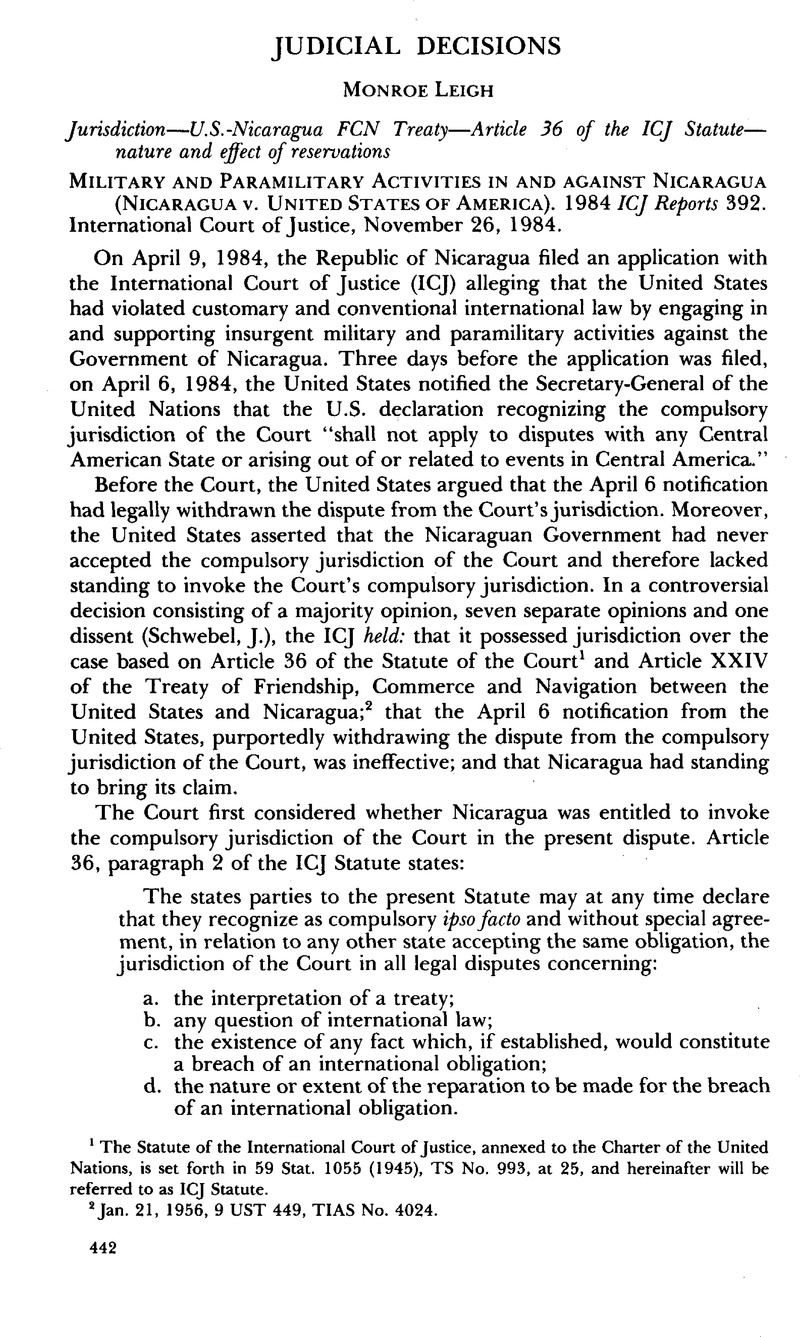Published online by Cambridge University Press: 27 February 2017

1 Dept. of State to the American Embassy at The Hague, telegram No. 017113, Jan. 18, 1985.
For the Court’s Judgment of Nov. 26, 1984, see Military and Paramilitary Activities in and against Nicaragua (Nicar. v. U.S.), 1984 ICJ Rep. 392, reprinted in 24 ILM 59 (1985).
2 Dept. of State File No. P85 0009-2151, and N.Y. Times, Jan. 19, 1985, at 4, cols. 1-6 (N.Y. ed.).
1 The Statute of the International Court of Justice, annexed to the Charter of the United Nations, is set forth in 59 Stat. 1055 (1945), TS No. 993, at 25, and hereinafter will be referred to as ICJ Statute.
2 Jan. 21, 1956, 9 UST 449, TIAS No. 4024.
3 A sixth judge voted with the majority on this issue but opined separately that, in his view, the Treaty of Friendship, Commerce and Navigation provided a firmer ground for jurisdiction. Separate Opinion of Judge Nagendra Singh, 1984 ICJ Rep. 392, 444.
4 1984 ICJ Rep. at 419.
5 In practice before the ICJ, an “application” is similar to a complaint in U.S. federal court practice and a “memorial” is another term for a legal brief.
6 1984 ICJ Rep. at 428 (citing Art. XIX (freedom of commerce and navigation), Art. XIV (freedom from restrictions on trade), Art. XVII (freedom from discrimination in obtaining marine insurance), Art. XX (freedom of transit) and Art. I (guarantee of equitable treatment to persons, property and other interests of nationals)).
7 1984 ICJ Rep. at 428-29.
8 In its application, Nicaragua relied upon the Charter of the United Nations, the Charter of the Organization of American States, the Montevideo Convention on Rights and Duties of States of 26 December 1933, and the Havana Convention on the Rights and Duties of States in the Event of Civil Strife of 20 February 1928. 1984 ICJ Rep. at 422.
9 1984 ICJ Rep. at 425 (citing Art. 79, para. 7 of the Rules of the Court).
10 Judge Jennings was willing to respect the United States’s interpretation of the reservation and its identification of the states “affected by the decision.” Because he felt that Nicaragua had raised fundamental and important issues of customary international law, however, he deferred to the majority on this issue, but urged that the multilateral treaty objection be dealt with in further proceedings of the Court. Separate Opinion of Judge Jennings, 1984 ICJ Rep. at 555. Judge Ruda, analyzing the legislative history of the reservation, concluded that it was wholly inapplicable in these circumstances. Therefore, he agreed with the Court’s rejection of the argument, but not on the ground that it lacked an exclusively preliminary character. Separate Opinion of Judge Ruda, id. at 458.